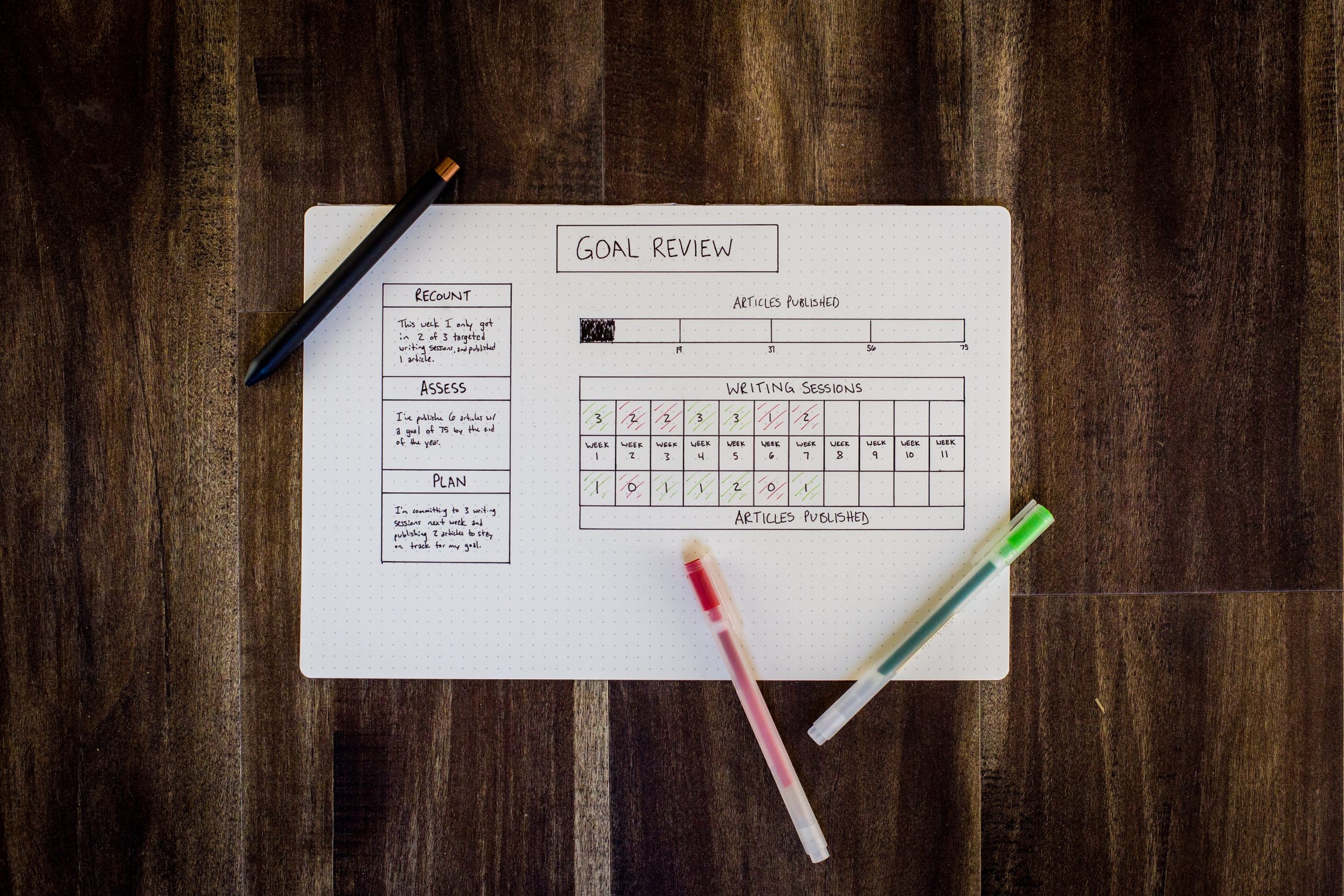Hello!
To improve productivity through better goal management might be something you've thought about before and you've likely estimated how this may affect the direction of your business. The truth is your subjective estimations of the direction your business should take are seldom reliable. Even if it were, estimating how far you’ve progressed towards this goal can be quite misleading. The same goes for the progress and performance of your employees. Even when you try your best, it’s quite hard not to let your personal biases affect their evaluation.
So, you need to take something completely subjective and abstract and turn it into something measurable. One way to do so is through better goal management, ideally, by applying a SMART goal system and using several additional tricks.
SMART Goals
 What is a SMART goal system? Well, SMART is an acronym for – Specific, Measurable, Attainable, Relevant, and Time-based.
What is a SMART goal system? Well, SMART is an acronym for – Specific, Measurable, Attainable, Relevant, and Time-based.
If there’s something to be achieved, you need to define what it is (specific) clearly. If your goal is in any way quantifiable, you need to clearly state how much of it needs to be achieved (measurable).
Picking an unrealistic goal will doom you to failure and disappointment from the very start (it needs to be attainable). To motivate you or make your life better in any way, a goal needs to be meaningful (relevant). Lastly, you need to have a time frame within which this goal should be achieved.
While everyone can set their personal goals, this is your job when it comes to goals relevant to the project. These goals can be used to steer your team in the right direction and help them grow professionally. This is also quite helpful in becoming a better leader and leading others on their own path to self-improvement.
What Are KPIs?
When discussing goals and how to improve productivity, there’s one more concept crucial for making your goals measurable. We’re, of course, talking about the key performance indicators (KPIs). KPI is a measurable value that you can use when evaluating an entity’s ability to achieve an objective.
The best way to define a KPI is to say that it has to satisfy several criteria.
- There needs to be the desired outcome.
- There needs to be a responsible party for the outcome.
- The responsible party needs to be able to influence the outcome.
- The desired outcome has to matter.
Other than this, there are several additional characteristics that can further improve the KPI. For instance, you need to have a clearly defined way to tell when the desired outcome is reached. Second, you need to establish how often the progress towards the outcome should be reviewed.
The key performance indicator will be used in the end in order to establish whether better goal management has truly led towards the desired productivity improvement.
Keep Records of Everything
 Keeping records of everything regarding the performance within your firm, or even your personal performance, will allow you to project growth over a longer period of time.
Keeping records of everything regarding the performance within your firm, or even your personal performance, will allow you to project growth over a longer period of time.
These KPIs need to be recorded in as much detail as possible. Even those issues that may not seem as relevant at the moment should probably be noted down in documents like performance reviews.
With the right IIM (intelligent information management) tool like M-Files, you will be able to find and access this data whenever you need it. With the option of cloud storage and current sizes of file formats, there’s really no reason for you not to discard any such resource.
Micro-goals and Milestones
The main goal is always something big, like the completion of the project. However, a project may take months (in rare occasions, even years) to complete, and unless you set up some temporary objectives, micro-goals, or milestones, it will feel like your team stagnates during this time. In other words, having micro-goals and reaching them on a regular basis is one of the best ways to keep your team motivated, thus boosting their performance.
You can also set a number of micro-goals to improve productivity throughout the day. In the workplace, this provides you with a sort of checklist. It’s there to provide you instant feedback and provide you with a reminder of other tasks you need to complete along the way.
Major projects take forever. So, while on the project, make sure to set some milestones or checkpoints. This way, you will be able to quantify your progress even before the project is completed. In other words, you will be able to tell that the project is 40% or 80% complete. As you get closer to the deadline, this will give you a necessary orientation of how much work you have to do in the time that is left.
Set a Challenge
 Parkinson’s law states that the work expands in order to fulfill the time available for its completion. In other words, if the deadline is generous, this doesn’t mean that your team will finish their work before it. In fact, the chances are that they will either submit their work just in time or even be slightly late with their tasks.
Parkinson’s law states that the work expands in order to fulfill the time available for its completion. In other words, if the deadline is generous, this doesn’t mean that your team will finish their work before it. In fact, the chances are that they will either submit their work just in time or even be slightly late with their tasks.
Also, if you give your team too much idle time, the chances are that they’ll get bored, which will result in an overall drop in productivity. Urgency, although it may sound stressful and anxiety-inducing, is one of the best motivators there are to improve productivity.
Sure, a self-disciplined employee will push themselves even when they have enough time. Nonetheless, relying on the individual self-discipline of your staff members is not the most reliable course of action.
Furthermore, giving your employees a task that is too simple or not meaningful enough will ensure that they miss out on the sense of accomplishment. In order for the completion of the task or a project to actually mean something, you need to make it challenging enough for the people involved.
Setting Productivity Goals
Productivity is a complex term that consists of multiple factors. Focusing on these factors individually can be a way to give your workplace productivity a sizable boost. In order to handle this in the most efficient way, you need to set proper productivity goals.
 For instance, knowledge regarding various work processes can affect the overall productivity of your staff. This means that as your team improves their knowledge, either through training, mentorship programs, or independent effort, your company, as a whole, will become more effective.
For instance, knowledge regarding various work processes can affect the overall productivity of your staff. This means that as your team improves their knowledge, either through training, mentorship programs, or independent effort, your company, as a whole, will become more effective.
Setting goals and milestones can help you track the exact progress that they’ve made. This can be especially handy if you plan to incentivize your staff members to make a future effort. It also helps you improve these processes in the future.
Another productivity factor is the issue of automation. Integration of automated processes into your workplace can allow your enterprise to achieve a higher level of overall efficiency and drastically reduce the margin of error. Automation is not meant to replace your human workforce but merely to take them off menial tasks that the machine can handle just as well (or even better). The efficiency of automation is usually measured in time saved or reduction of time spent.
In industries like manufacturing, it is possible to measure the efficiency of your processes through the efficiency improvements that come from using better tools. This allows you to compare two tools and even compare their ROIs. Other than helping your staff become more productive, this will also help your decision-making process in the future (especially when it comes to topics such as the acquisition of new equipment). The efficiency of tools is measured in things like a number of units produced or tons of produced materials.
Lastly, process improvement itself can sum up all your efforts to streamline your production or enhance your services. This is measured by estimating the output per hour worked. By improving this, you can create a scenario in which you get to greatly outperform competitors which employ larger staff.
Overcoming a Blockade
 A blockade or an inability to handle a current task can cause a serious problem for any goal in the long term. With long-term goals, this can be quite serious, seeing how a single task may be pivotal for completing the project.
A blockade or an inability to handle a current task can cause a serious problem for any goal in the long term. With long-term goals, this can be quite serious, seeing how a single task may be pivotal for completing the project.
Other than this, a blockade tends to discourage your staff, especially if the checkpoints that you’ve set need to be reached in sequence. In this scenario, it is one of your tasks to help readjust your goals to allow your team to move forward.
Just because your goals were valid at one point, this doesn’t mean that they’re still achievable (or achievable as easily). Your team might have diminished in size over the course of the last few months, or you may have replaced experienced employees with inexperienced staff members. Moments of economic turmoil may affect your entire industry, which means that sales goals of the previous year/months may no longer be realistic goals. The thing is that you keep all the records and that you keep reassessing the situation on a regular basis.
On the other hand, there are moments where your staff members are undergoing personal turmoil. The only way to improve productivity is to notice this in time is to pay close attention.
Improve Your Productivity And Grow Your Business
Improving your productivity is important for propelling your business and taking it to the next level. It all comes down to three things. First, setting the KPIs. Second, tracking and keeping records of feedback based on these KPIs. Third, you need to learn how to break down all the major goals into milestones, checkpoints, or micro-goals. This way, you have all the data you need to create a more productive work environment. Information provided by analyzing this data will give you the most faithful representation of your company’s real state of affairs (productivity-wise).
- Test Data Management: Strategies for Efficient and Effective Testing
- Reasons You Should Invest in a High-Quality Document Management Software
- What You Need To Know To Improve Your Contract Lifecycle Management
Thank you!
Subscribe to our newsletter! Join us on social networks!
See you!






